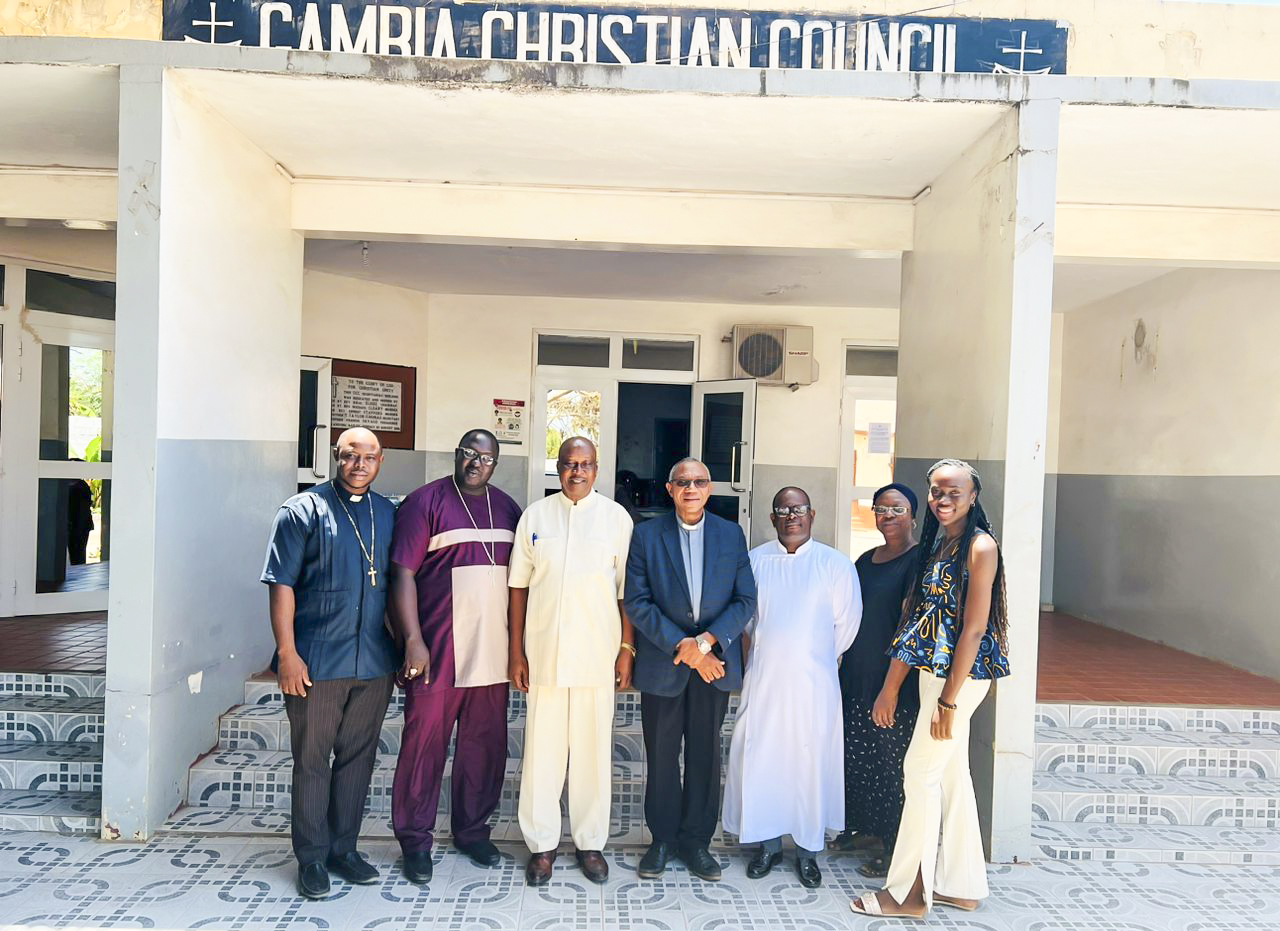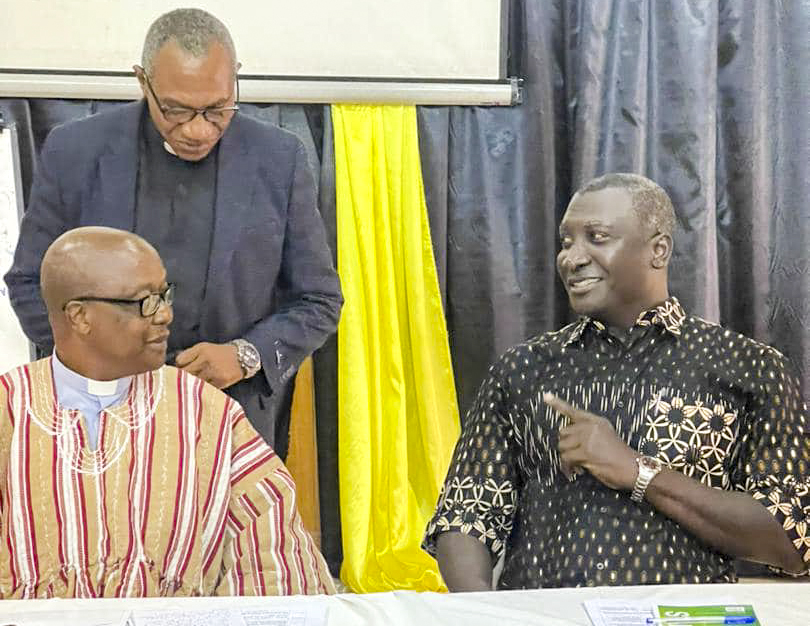Promoting Freedom of Religion or Belief (FoRB) in Anglophone West Africa: The Gambia and Sierra Leone’s ToT Workshops
- By PROCMURA
- Events
- Hits: 1770

PROCMURA continued with its overall goal of upholding the principles of religious freedom and all that it entails by building the capacity of religious leaders, faith actors, media, and government representatives, among other duty bearers across its constituencies in Africa.
Over the past months, PROCMURA, through support and collaboration with a consortium of partners in the UK, including the Church of England and UKAID, has been coordinating and implementing the capacity-building project for religious leaders and other stakeholders in several countries in Africa.
Through its Area Committees, consultants and representatives, and the Council of Churches, PROCMURA has pitched ground in the Anglophone West African region more recently being Training of Trainers (ToT) workshops in the southwest of Sierra Leone and in The Gambia, engaged the media as stakeholders and raised awareness on FoRB in the community through youth diapraxis activities.
PROCMURA acknowledges the fact that equipping religious leaders and other key stakeholders with knowledge and skills on the promotion of FoRB is the foundation and catalyst to PROCMURA realizing its goal of promoting the freedom of religion for all across the continent of Africa as a fundamental human right highlighted in the Universal Declaration of Human Rights by the United Nations. They play a central role in influencing the perceptions, attitudes, opinions, behaviors, and habits of the masses they lead. As a result, they make them (religious leaders) essential stakeholders in PROCMURA’s journey of promoting FoRB across Africa.
The Gambia
In Banjul Gambia, PROCMURA brought together a cross-section of religious leaders from the Gambia Christian Council, the Catholic Diocese of Banjul, the Methodist Church, the Gambia Supreme Islamic Council, the Women’s Association for Victims Empowerment (WAVE), selected members of parliament, and representatives from the Caucas on FoRB among other actors for a two-day workshop on promoting the Freedom of Religion or Belief (FoRB) for religious tolerance and peaceful coexistence in The Gambia.
In his welcome remarks, the host, Very Rev. James Cole, who is also the FoRB National Coordinator and the interim PROCMURA Chairperson in the Gambia, noted that the training was timely and crucial for the Gambia given the rise of terrorist attacks and activities affecting its neighboring countries in the region like Nigeria and Mali among other emerging issues such as constitutional changes and reforms. He observed that The Gambia has a high percentage of Muslims at 95% and 4.5 % Christians but it is one of the countries that has had high religious freedom in the continent and has, therefore, set a good example to others in terms of promoting religious freedom.
In his presentation on why the Freedom of Religion or Belief (FoRB) is essential for Africans and the world at large, PROCMURA’s Consultant, Rev. Dr. Johnson Mbillah, reiterated the need to promote the freedom of religion for all in Africa, reminding participants that Africa is a religious continent and its people are, therefore, religious and therefore, individuals should be accorded that freedom to practice the religion of their choice without any discrimination meted on them because of their faith. Rev. Dr. Mbillah also emphasized the link between FoRB – and the need and importance to promote it, with PROCMURA’s overall goal of wanting “to see an African continent where Christians and Muslims uphold the principles of religious freedom and all that it entails”, saying that if the two religions that form a majority in Africa are at peace with one another, the continent will be at peace.

On his part, Muhammed Al-Lamin K Sanne of The Gambia Supreme Islamic Council thanked PROCMURA for considering The Gambia in its journey of promoting FoRB across the continent. While making his presentation on religious tolerance and peaceful coexistence from the Muslim perspective, Mr. Muhammed underscored the fact that Islam is a religion of peace and, as such, respects people of other faiths.
The training also provided a platform for the various participants to engage facilitators on several topics, including the global trends and challenges in protecting and promoting religious tolerance and peaceful coexistence in line with FoRB, religious tolerance and peaceful coexistence from the Christian perspective, and religious tolerance and peaceful coexistence in the context of The Gambia in which participants shared their experiences and the FoRB realities and situations in their respective areas and the country at large.
A representative of The Gambia Christian Council, who also officially closed the training and stood in for the Presiding Bishop of the Methodist Mission in The Gambia, Most Rev. Bannie E F Manga, commended PROCMURA for its efforts in making sure that people from across the religious divides in Africa live in peace irrespective of their religious differences.
Sierra Leone
On the other hand, just like in the Gambia, Sierra Leone’s Constitution provides for and protects the freedom of religion. However, the country has been experiencing cases of FoRB violations including instances of people being discriminated against based on the religion they subscribe to.
To raise awareness of the need and importance of protecting and promoting the freedom of religion in Sierra Leone, just like in many other African countries, the Programme for Christian-Muslim Relations in Africa (PROCMURA) collaborated with the Council of Churches in Sierra Leone for a two-days capacity building workshop in Kambai, northern Sierra Leone to shed light on tolerance and peaceful coexistence among Muslims and Christians, the two faith communities being the majority in the West African country.
The workshop, which brought together forty-one participants from respective communities in the district, shed light on religious tolerance and peaceful coexistence among Christians and Muslims, them being a majority among religious communities in Sierra Leone.

The workshop provided a platform for the various stakeholders to give their insights on FoRB violations and promote and protect this fundamental right from different perspectives. In her presentation on the “Christian Perspective on Freedom of Religion or Belief”, the Chairperson of PROCMURA in Sierra Leone, Rev Christiana Sutton-Koroma, reiterated PROCMURA’s stand that everyone has the freedom and right to belong to the religion of their choice and no one should serve as a barrier to another person’s faith. She further said that God is a democratic God, so He gave everyone the free will to choose. She additionally noted that Sierra Leone enjoys commendation as a country with religious tolerance and is often cited as a great example.
Rev. Christiana further emphasized that the Bible encourages Christians to live at peace with all men and to love their neighbors as themselves. Therefore, there was no need or ground to disturb or discriminate against people practicing other forms of faith different from theirs.
Sheik Ibrahim Sesay, a member of FoRB, added that there should be no compulsion in religion as justified by the Holy Quran, citing surah 18 verse 256 “there is no compulsion in religion. Verily, the right path has become distinct from the wrong path. Whoever disbelieves in taught and believes in Allah has grasped the most trustworthy handhold that will never break. And Allah is All-hearer, All-knower”. He said Allah, who knows and is a witness to all things, knows about religious differences. Therefore, people must not fight each other over religion. He said Islam is a peaceful religion, so its followers should practice the same, giving several instances in the Holy Quran that preach peace and the friendly relationship between Christians and Muslims.
In his address, Bishop Arnold Temple, CCSL’s Ecumenical Desk Officer, explained that Christians and Muslims are spiritual descendants of Abraham. He said, “We are different in doctrines and interpretation of who God is, but that does not change who God is because He is infinite; He goes beyond human experience”. While narrating how the area has previously suffered from religious conflicts, Kambia Chief Imam, Sheik Nabil Dumbuya, who has a twelve-year teaching experience in religious studies, appreciated that the peace-building programme by PROCMURA and the CCSL was a step in the right direction. He further committed to including messages about the Freedom of Religion or Belief in his future lectures on platforms at his disposal.
Additionally, the District Coordinator for Peace, Dr. Nabieu Yayah Yillah, agreed with other participants that the message of Freedom of Religion or Belief is timely because Kambia and the larger northern Sierra Leone have learned from the mistake of fighting over religion in the past. Dr. Yillah called on people to respect the religious other and their faith.

On their part, the government representatives in the workshop expressed commitment to protecting the freedom of religion. Ahmed Tejan Sandy from the Office of National Security (ONS) said ONS is responsible for identifying possible threats to FORB and implementing possible and proactive interventions to curb any violations. He said ONS works closely with the Inter-Religious Council and the CCSL because they play a pivotal role in preaching peace in society for the peaceful coexistence of people from different religious backgrounds and for regional development.

In Sierra Leone, for instance, cases of discrimination against people, persecution, and suffering violence based on the religion they profess are still prevalent, happenings that have led to conflicts, increased social tensions, and human rights abuses. The FORB violations in Sierra Leone happen despite the country’s constitution protecting this human right.
For years now, PROCMURA has made it its core business to continually and proactively build bridges of good neighborliness between Christians and Muslims in Africa as guided by its mission of working towards “A continent where Christian and Muslim communities, despite their differences, work together for justice, peace, and reconciliation, towards the holistic development of the human family and the environment”. PROCMURA believes this is central to promoting freedom of religion for all in Africa.

